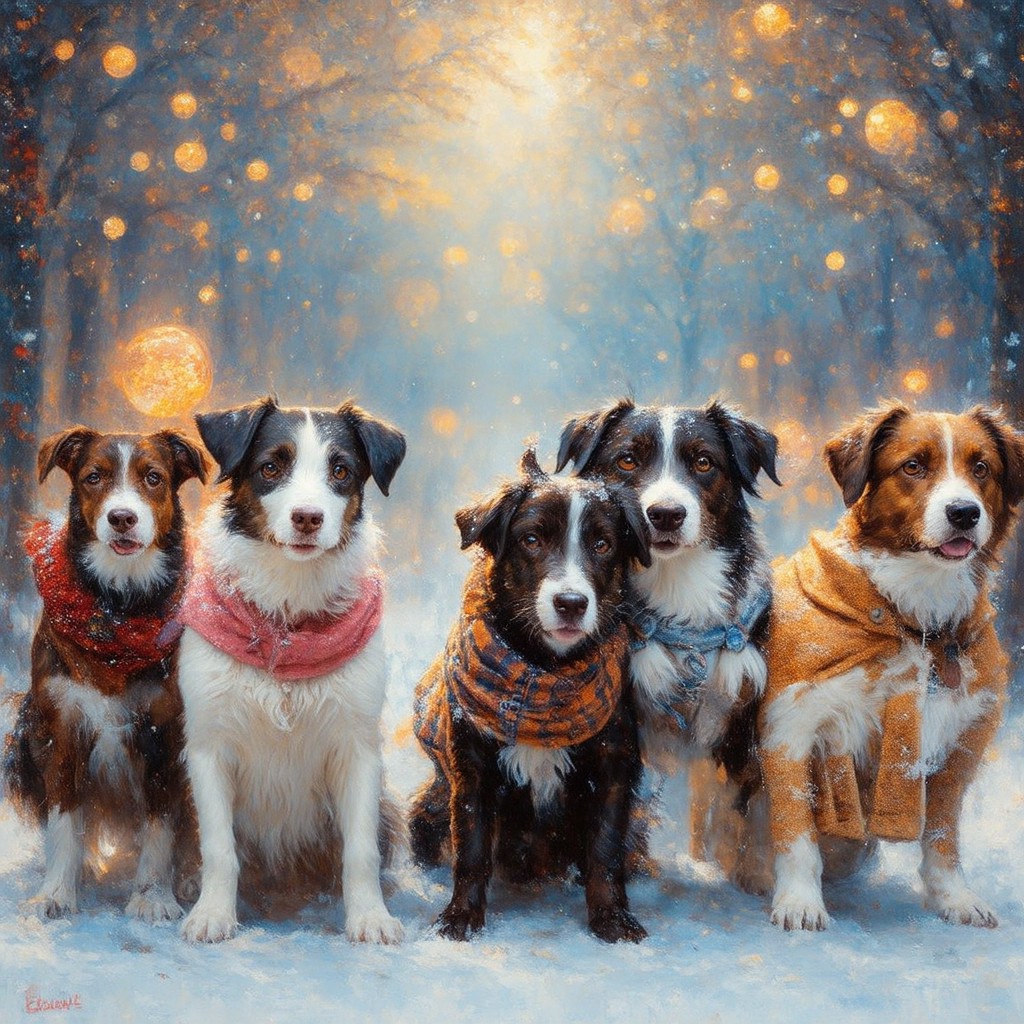Key Takeaways
- Choosing the right dog coat is essential for keeping your canine warm and protected in cold weather.
- Small, short-haired, elderly, and sick dogs benefit significantly from wearing coats during colder months.
- Look for features such as waterproofing, insulation, and adjustable fit to ensure maximum comfort and effectiveness.
- Consult with veterinarians for tailored advice on whether your dog needs a coat based on their breed and health.
- Dog coats enhance outdoor experiences by providing warmth, safety, and mobility, promoting healthier activity levels.
Choosing the right dog coats is essential for ensuring your canine companion stays warm and stylish during the colder months. In this article, we will explore the various factors that influence the decision to dress your dog in a coat, including the benefits of dog coats for different breeds and expert opinions on whether vets recommend dog coats. We will also delve into the best features to look for in dog winter coats, comparing options like waterproof versus insulated jackets. Additionally, we will address common concerns such as whether dogs feel the cold at night and how dog coats can enhance outdoor experiences. By the end of this article, you will have a comprehensive understanding of how to choose the perfect dog coat for your furry friend, ensuring they remain cozy and protected against the elements.
Choosing the Right Dog Coats: Expert Insights on Keeping Your Canine Warm and Stylish
Should dogs wear coats?
Dogs should wear coats in cold weather conditions, particularly when temperatures drop below 45°F (7°C), as they can be susceptible to hypothermia and frostbite. Here are key considerations regarding whether your dog needs a coat:
- Breed and Coat Type: Breeds with thick fur, such as Huskies or Malamutes, are generally more resistant to cold weather. In contrast, short-haired or small breeds like Chihuahuas and Greyhounds may require additional warmth. According to the American Kennel Club, dogs with less body fat and shorter coats are more vulnerable to cold.
- Age and Health: Puppies, senior dogs, and those with health issues (like arthritis) may struggle to maintain body heat. A coat can provide necessary insulation and comfort. The ASPCA emphasizes the importance of monitoring these dogs in colder climates.
- Duration of Exposure: If your dog will be outside for extended periods, a coat is advisable. Even active dogs can become cold if they are outside for too long. The Humane Society recommends assessing your dog’s comfort level and adjusting their outdoor time accordingly.
- Signs of Discomfort: If your dog shivers, whines, or tries to hide, these are signs they may be too cold. In such cases, a well-fitted coat can help alleviate discomfort. Always ensure the coat fits properly to avoid restricting movement.
- Training and Adaptation: If your dog is resistant to wearing a coat, gradually acclimate them by allowing them to wear it for short periods indoors before venturing outside. Positive reinforcement can help them associate the coat with comfort and warmth.
In summary, while not all dogs need coats, those that are small, short-haired, elderly, or unwell may benefit significantly from wearing one in cold weather. Always prioritize your dog’s comfort and well-being when deciding on their winter attire. For further guidance, consult resources from veterinary professionals or organizations like the American Kennel Club.
Benefits of Dog Coats for Different Breeds
Dog coats serve various purposes, particularly in cold weather, and their benefits can vary significantly depending on the breed. Here are some advantages of dog coats tailored to different types of dogs:
- Small Breeds: Coats for small dogs, such as Chihuahuas and Dachshunds, provide essential warmth due to their limited body mass and short fur. A dog coat for winter can help prevent hypothermia and keep them comfortable during walks.
- Short-Haired Breeds: Breeds like Greyhounds and Whippets have minimal insulation from their short coats. A warm dog coat can help maintain their body temperature, especially during outdoor activities in chilly weather.
- Senior Dogs: Older dogs often have a harder time regulating their body temperature. A cozy dog jacket can provide the extra warmth they need to stay comfortable.
- Working Dogs: Breeds used for outdoor work, such as hunting or herding, may benefit from specialized coats that offer protection against the elements while allowing for mobility.
Choosing the right coat for your dog not only enhances their comfort but also ensures they can enjoy outdoor activities without the risk of cold-related health issues.
Choosing the Right Size for Your Dog Coat
Selecting the correct size for your dog’s coat is crucial for their comfort and effectiveness. Here are some tips to ensure you choose the right fit:
- Measure Your Dog: Use a measuring tape to determine your dog’s neck, chest, and back length. This will help you find a coat that fits snugly without being too tight.
- Check Size Charts: Different brands may have varying size charts. Always refer to the specific sizing guide provided by the manufacturer to ensure an accurate fit.
- Consider Adjustability: Look for coats with adjustable straps or Velcro closures. This feature allows for a better fit, accommodating any changes in your dog’s weight or body shape.
- Try It On: If possible, have your dog try on the coat before purchasing. Ensure they can move freely and that the coat does not restrict their movement.
By taking the time to choose the right size, you can ensure that your dog stays warm and comfortable in their new coat, enhancing their overall winter experience.

Do vets recommend dog coats?
Yes, veterinarians do recommend dog coats, especially for certain breeds and conditions. Here are key considerations regarding the necessity of dog coats in winter:
- Breeds Needing Extra Warmth: Small breeds, short-haired dogs, and those with low body fat are particularly susceptible to cold weather. Breeds like Chihuahuas, Dachshunds, and Greyhounds may require additional insulation to maintain their body temperature.
- Health Considerations: Older dogs, puppies, and those with health issues such as arthritis or other chronic conditions may benefit significantly from wearing a coat. Keeping them warm can alleviate discomfort and improve their overall well-being.
- Weather Conditions: Dogs exposed to cold, windy, or wet conditions are at a higher risk of hypothermia. A well-fitted coat can provide essential protection against harsh elements, ensuring they stay dry and warm during walks.
- Coat Materials: When selecting a dog coat, consider materials that offer insulation and water resistance. Fleece-lined or waterproof options are ideal for maintaining warmth and comfort.
- Fit and Comfort: It’s crucial that the coat fits properly—too tight can restrict movement, while too loose may not provide adequate warmth. Always measure your dog before purchasing a coat.
- Veterinary Guidance: Consulting with a veterinarian can provide personalized recommendations based on your dog’s specific needs, breed, and health status. They can help determine if a coat is necessary and suggest suitable options.
For further reading on the importance of keeping pets warm during winter, you can refer to resources from the American Kennel Club (AKC) and the ASPCA, which provide comprehensive guidelines on pet care in cold weather.
Expert Opinions on Dog Coats for Cold Weather
Veterinary experts emphasize the importance of dog coats during cold weather, particularly for breeds that are more vulnerable to low temperatures. Many veterinarians advocate for the use of dog coats as a proactive measure to prevent health issues associated with cold exposure. Here are some expert insights:
- Preventing Hypothermia: Dogs can suffer from hypothermia just like humans. A well-insulated dog coat for winter can help maintain their body heat.
- Improving Mobility: A properly fitted coat allows dogs to move freely while providing warmth. This is especially important for active breeds that enjoy outdoor activities.
- Enhanced Comfort: Many dogs feel more comfortable and secure when wearing a coat, which can reduce anxiety during winter outings.
Ultimately, the consensus among veterinarians is clear: investing in a quality dog jacket can significantly enhance your dog’s comfort and health during the colder months.
What is the best coat for dogs?
When selecting the best coat for dogs, several factors must be considered to ensure comfort, warmth, and protection from the elements. Here are key recommendations based on recent studies and expert opinions:
- Material: Look for coats made from waterproof and breathable materials such as nylon or polyester. Insulated linings, like fleece or down, provide additional warmth. According to the American Kennel Club, these materials help regulate body temperature and keep dogs dry.
- Fit: A well-fitting coat is crucial. It should cover the dog’s neck, back, and belly without restricting movement. Measure your dog’s girth and length to find the right size. Brands like Ruffwear and Kurgo offer adjustable options that cater to various breeds.
- Style: Consider the coat style based on your dog’s needs. For extreme cold, opt for full-body suits or parkas that cover more surface area. For milder climates, a lightweight jacket may suffice. The ASPCA recommends coats with reflective strips for visibility during nighttime walks.
- Ease of Use: Choose coats that are easy to put on and take off. Velcro straps or zippers can simplify the process, especially for active dogs. Look for user reviews that highlight ease of use.
- Additional Features: Some coats come with hoods, harness openings, or pockets for storing essentials. These features can enhance functionality, making walks more enjoyable.
- Brand Recommendations: Popular brands for dog coats include PetFusion, Canada Pooch, and WeatherBeeta, which are known for their durability and effectiveness in cold weather.
- Expert Opinions: According to a 2023 study published in the Journal of Veterinary Behavior, dogs wearing properly fitted coats showed reduced signs of stress and discomfort in cold weather, emphasizing the importance of choosing the right coat.
By considering these factors, you can select a coat that not only keeps your dog warm but also enhances their overall well-being during colder months. For more options, check out dog coats and canine sweaters.
Top Features to Look for in Dog Winter Coats
When shopping for dog winter coats, it’s essential to focus on features that ensure your pet’s comfort and safety. Here are some top features to consider:
- Waterproofing: A waterproof coat is vital for keeping your dog dry during rain or snow. Look for materials that repel water effectively.
- Insulation: Coats with good insulation, such as fleece or down, provide warmth without adding excessive bulk.
- Reflective Elements: Coats with reflective strips enhance visibility during low-light conditions, making evening walks safer.
- Adjustable Fit: Coats with adjustable straps or Velcro closures allow for a snug fit, accommodating different body shapes and sizes.
- Easy Care: Opt for machine-washable coats to simplify cleaning and maintenance.
These features not only enhance the functionality of dog jackets but also ensure that your furry friend stays warm and stylish throughout the winter months.
Comparison of Dog Jackets for Winter: Waterproof vs. Insulated
Choosing between waterproof and insulated dog jackets can be challenging. Each type serves a specific purpose and is suited for different weather conditions:
- Waterproof Jackets: Ideal for wet conditions, these jackets keep your dog dry and comfortable during rain or snow. They are often lightweight and breathable, making them suitable for active dogs who enjoy outdoor adventures.
- Insulated Jackets: Best for extremely cold weather, insulated jackets provide warmth and protection from harsh temperatures. They are typically bulkier but are essential for dogs that spend extended periods outdoors in winter.
Ultimately, the choice between waterproof and insulated jackets depends on your dog’s specific needs and the climate in which you live. For a comprehensive selection of dog coats for winter, explore various options to find the perfect fit for your canine companion.
Do dog sweaters really keep dogs warm?
The Effectiveness of Canine Sweaters in Cold Weather
Dog sweaters are effective in keeping dogs warm by trapping a layer of warm air close to their bodies. This trapped air is heated by the dog’s own body heat, creating a thermal barrier that prevents warmth from escaping. The effectiveness of a dog sweater largely depends on its material and thickness; thicker sweaters generally provide better insulation.
Research indicates that dogs, particularly those with short coats or small breeds, are more susceptible to cold temperatures. A study published in the Journal of Veterinary Behavior highlights that dogs can experience discomfort in temperatures below 45°F (7°C), making sweaters a practical solution for outdoor activities in colder climates (Hoffman et al., 2018).
When selecting a dog sweater, consider the following factors for optimal warmth:
- Material: Look for sweaters made from wool, fleece, or thermal fabrics, which offer superior insulation.
- Fit: Ensure the sweater fits snugly but comfortably, allowing for movement without restricting circulation.
- Design: Opt for designs that cover the dog’s neck and belly, as these areas are particularly vulnerable to cold.
In addition to providing warmth, dog sweaters can also enhance your pet’s comfort during winter walks, reducing the risk of hypothermia and frostbite. For more information on pet care and wellness, consult resources from veterinary professionals and pet care organizations.
Best Sweater Options for Small Dogs and Large Dogs
When it comes to choosing the best sweaters for dogs, size matters significantly. Small dog sweaters should be lightweight yet warm, ensuring they do not hinder movement. Look for coats for small dogs that are designed with adjustable features for a better fit.
For large dogs, opt for thicker, more durable materials that can withstand outdoor activities. Large dog jackets should cover the chest and belly adequately, providing comprehensive warmth. Brands like Chewy and Petco offer a variety of options tailored for both small and large breeds, ensuring your furry friend stays cozy during the colder months.
Ultimately, whether you choose a dog coat for large dogs or a snug canine sweater for your small companion, ensuring the right fit and material will keep your dog warm and stylish throughout winter.

Do Dogs Feel the Cold at Night?
Yes, dogs do feel the cold at night, and their sensitivity to low temperatures can vary significantly based on several factors, including breed, coat type, age, and overall health.
Understanding Canine Comfort: Temperature Sensitivity
Dogs typically have a higher average body temperature than humans, around 101 to 102.5 degrees Fahrenheit. Their fur provides insulation, but the effectiveness of this insulation depends on the thickness and type of coat. Breeds with thick, double coats, such as Huskies and Malamutes, are better equipped to handle cold temperatures compared to those with short or fine coats, like Chihuahuas or Greyhounds.
Puppies and senior dogs are particularly vulnerable to cold weather. Young dogs may not have developed a full coat, while older dogs may have health issues that make them less tolerant of cold. Additionally, dogs with certain medical conditions, such as arthritis, may experience increased discomfort in colder temperatures.
If a dog is feeling cold, they may exhibit behaviors such as shivering, seeking warmth, or reluctance to go outside. Providing a warm, insulated space for your dog to sleep is crucial, especially during colder months.
Tips for Keeping Your Dog Warm at Night
- Provide Adequate Bedding: Use thick, insulated bedding to help retain body heat.
- Limit Outdoor Time: During extremely cold nights, limit your dog’s time outside and ensure they have a warm place to retreat to.
- Consider Dog Apparel: For short-haired breeds, consider using dog sweaters or coats designed to provide extra warmth.
According to the American Kennel Club, it is essential to monitor your dog’s behavior in cold weather and adjust their living conditions accordingly. Keeping dogs indoors during cold nights is generally the best practice to ensure their comfort and safety.
In conclusion, while dogs have some natural insulation against the cold, they can still feel uncomfortable or even suffer from hypothermia in extreme conditions. Ensuring they have a warm, safe environment is vital for their well-being.
Do dog coats make a difference?
Dog coats can significantly impact your pet’s comfort and health, especially in colder climates. Here are several key points to consider:
- Thermal Insulation: Dog jackets provide essential warmth for short-haired breeds and small dogs, which lose body heat more rapidly than larger breeds. According to a study published in the Journal of Veterinary Behavior, maintaining an appropriate body temperature is crucial for a dog’s overall well-being, particularly in extreme weather conditions.
- Protection from Elements: Coats shield dogs from harsh weather elements such as wind, rain, and snow. This is particularly important for older dogs or those with health issues, as exposure to cold can exacerbate conditions like arthritis.
- Comfort and Mobility: A well-fitted dog coat allows for ease of movement while providing warmth. It’s essential to choose a coat that fits properly to avoid restricting your dog’s mobility, which can lead to discomfort or injury.
- Psychological Benefits: Wearing a coat can also have psychological benefits for dogs, as it may help them feel secure and comfortable during outdoor activities. This is particularly relevant for dogs that may be anxious in cold weather.
- Fashion and Visibility: While functionality is key, many dog coats come in stylish designs that can enhance visibility during walks in low-light conditions, contributing to safety.
In conclusion, dog coats are not merely a fashion statement; they play a vital role in ensuring your dog’s comfort and health during colder months. For further reading on the importance of proper dog apparel, you can refer to resources from the American Kennel Club and the Journal of Veterinary Behavior.
Real-Life Benefits of Using Dog Coats in Winter
Using dog coats in winter offers numerous real-life benefits that enhance your dog’s outdoor experience. Here are some of the most notable advantages:
- Enhanced Warmth: Dog winter coats are designed to provide extra insulation, keeping your pet warm during chilly walks. This is particularly beneficial for breeds that are not naturally equipped to handle cold weather.
- Reduced Risk of Hypothermia: Prolonged exposure to cold can lead to hypothermia in dogs. A warm dog coat can help mitigate this risk, especially for smaller breeds or those with short fur.
- Improved Outdoor Enjoyment: With the right coat, dogs can enjoy outdoor activities without the discomfort of cold weather. This can lead to increased exercise and better overall health.
- Protection from Snow and Ice: Many dog jackets for winter are designed to repel water and prevent snow from accumulating on your dog’s fur, which can lead to discomfort and coldness.
Incorporating a quality dog coat into your pet’s winter wardrobe can significantly enhance their comfort and enjoyment during the colder months.
How Dog Coats Improve Outdoor Experiences
Dog coats not only provide warmth but also improve outdoor experiences in several ways:
- Increased Activity Levels: When dogs are comfortable in their coats, they are more likely to engage in outdoor play and exercise, which is essential for their physical and mental health.
- Safety Features: Many dog jackets come with reflective materials that enhance visibility during low-light conditions, making walks safer for both you and your pet.
- Ease of Cleaning: Most modern dog coats are machine washable, making it easy to keep them clean and fresh after outdoor adventures.
Choosing the right dog jackets can transform your pet’s winter outings, ensuring they stay warm, safe, and happy.
Exploring Dog Coats Nearby
Where to Find Quality Dog Coats for Sale
Finding quality dog coats is essential for ensuring your pet stays warm and stylish during colder months. Local pet stores, such as Petco, offer a variety of options, including dog jackets and coats for small dogs and large dogs. Additionally, online retailers like Chewy and Amazon provide extensive selections, including specialized dog coats for winter and dog coats with built-in harnesses. When shopping, consider factors such as material, insulation, and fit to ensure your dog is comfortable and protected from the elements.
Online vs. Local Stores: Best Places to Buy Dog Jackets
When deciding between online and local stores for purchasing dog jackets, each option has its advantages. Local stores allow you to physically assess the quality and fit of dog coats, which is particularly important for breeds with unique body shapes. However, online shopping offers convenience and often a wider selection, including specialized items like dog winter coats and dog coats for cold weather. Websites like Amazon provide user reviews that can help you make informed decisions. Ultimately, the best choice depends on your preferences and your dog’s specific needs.













